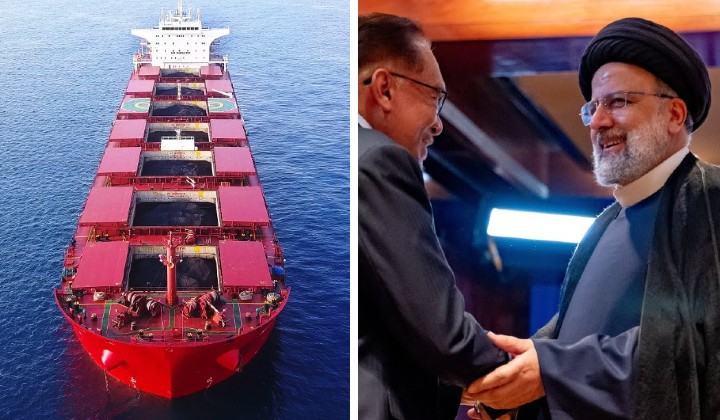Malaysia Defiant: We Only Recognise UN Sanctions, Not US Threats
Malaysia maintains its position on recognising only sanctions imposed by the United Nations Security Council, despite concerns a top US official raised about Iranian oil sales in the region.

Subscribe to our FREE Newsletter, or Telegram and WhatsApp channels for the latest stories and updates.
In a recent development that has caught the public’s attention, Home Minister Datuk Seri Saifuddin Nasution Ismail has reaffirmed the country’s stance on recognizing only sanctions imposed by the United Nations Security Council (UNSC).
This statement comes in response to claims made by the US Treasury Department’s Under Secretary for Terrorism and Financial Intelligence Brian Nelson, who suggested that Iran has been relying on Malaysian service providers to sell US-sanctioned oil in the region.
During a meeting with Nelson, Saifuddin emphasized Malaysia’s commitment to combating terrorism financing and tackling illicit financial activities.
However, he also made it clear that Malaysia, as a sovereign nation, will only adhere to sanctions imposed by the UN and not by individual countries.
While acknowledging the concerns raised by US officials, Saifuddin stressed the need for verification of any claims linking certain individuals and organizations in Malaysia to Iran and its proxies, such as Hamas.
The Malaysian government has been vocal in its support for the Palestinian cause, with Prime Minister Datuk Seri Anwar Ibrahim expressing his backing for Hamas despite the risk of US sanctions.
Tightening the Net on Iranian Oil: A Global Effort
The issue of Iranian oil sales has been contentious, with the US imposing sanctions on Iran and its proxies to curb money flows that it believes are being used to promote instability in the Middle East.
US oil sanctions on Iran began in stages, with the earliest measures dating back to the 1980s and the most recent round in May 2018.
The primary reason for sanctions against Iran is its nuclear program.
The US is now intensifying its efforts to crack down on Iran’s illicit oil sales, with a particular focus on the country’s alleged use of Malaysian ports and service providers to circumvent sanctions.
During his visit to Kuala Lumpur, Nelson highlighted concerns about ship-to-ship transfers and the alleged involvement of Malaysian port administrators and tugboat operators in facilitating the movement of Iranian oil.
American officials are also engaging with key stakeholders in Singapore and Malaysia to bolster support for tighter restrictions on Iranian crude exports and to curb Russia’s ability to finance its ongoing war in Ukraine.
Iran’s historical ties to Malaysia have made it a focal point for the US, especially in light of recent developments, including an attack on Israel last month and Tehran’s support for groups like Hamas.
The US Congress recently passed a package of measures that expands the scope of sanctions to include foreign ports, vessels, and refineries knowingly involved in processing or shipping Iranian crude.
The new restrictions also extend secondary sanctions to cover all transactions with sanctioned Iranian banks used to purchase petroleum and oil-derived products.
BLOOMBERG on a new US push to enforce oil sanctions against Iran, focusing on illegal Iranian sales via Malaysia:
— Winter Intel (@wntrintel) May 7, 2024
“American officials are meeting oil industry executives, regulators and financial institutions in Singapore and Malaysia this week to prop up US efforts to tighten… pic.twitter.com/qBMqnB516X
Malaysia’s Delicate Balance
The stance taken by Malaysia has drawn mixed reactions from experts and analysts.
Economics professor Geoffrey Williams from the Malaysia University of Science and Technology (MUST) pointed out that Malaysian businesses are free to engage with any entity unless restricted by UN sanctions.
However, he also noted that the US could stop doing business with Malaysian companies involved in activities it disapproves of.
Some analysts view the US delegation’s visit as an intimidation tactic in response to Anwar’s pro-Palestine stance.
Nevertheless, they also recognize the importance of Malaysia as a key US partner in the region, especially with the country set to assume the role of ASEAN chair next year.
As the situation unfolds, the Malaysian government will need to carefully assess the implications of its stance and work towards finding a resolution that upholds its sovereignty while maintaining positive relations with key partners like the US.
Amidst these high-stakes manoeuvres, it’s crucial to note that everyday Malaysians stand to gain little from these risky geopolitical gambles, underscoring the importance of a strategy that not only preserves national sovereignty but also prioritizes the welfare of its citizens.
…minyak Iran.
— Naratif Rakyat 🇲🇾 (@NaratifRakyat) May 9, 2024
Kegiatan ini sudah tentu dalam pengetahuan kerajaan.
Kegiatan ini tidak memberi apa-apa faedah kepada Rakyat Malaysia dan negara – cuma memperkayakan individu-individu tertentu dan ianya sangat lumayan.
Bayangkan caj yang dikenakan untuk label semula minyak…
Share your thoughts with us via TRP’s Facebook, Twitter, Instagram, or Threads.





